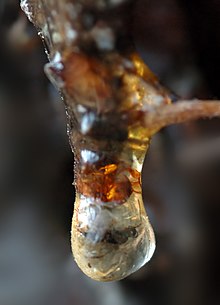Solid or semisolid natural organic flammable substance formed by plant secretions that are typically not water-soluble
Merriam-Webster Online Dictionary
resin (noun)1.
a) any of various solid or semisolid amorphous fusible flammable natural organic substances that are usually transparent or translucent and yellowish to brown, are formed especially in plant secretions, are soluble in organic solvents (as ether) but not in water, are electrical nonconductors, and are used chiefly in varnishes, printing inks, plastics, and sizes and in medicine
b) - rosin
2.
a) any of a large class of synthetic products that have some of the physical properties of natural but are different chemically and are used chiefly in plastics - resins
b) any of various products made from a natural resin or a natural polymer
transitive verb
to treat with resin
resin (Wikipedia)

Insect trapped in resin
In polymer chemistry and materials science, resin is a solid or highly viscous substance of plant or synthetic origin that is typically convertible into polymers. Resins are usually mixtures of organic compounds. This article focuses on naturally-occurring resins.
Plants secrete resins for their protective benefits in response to injury. The resin protects the plant from insects and pathogens. Resins confound a wide range of herbivores, insects, and pathogens, while the volatile phenolic compounds may attract benefactors such as parasitoids or predators of the herbivores that attack the plant.

